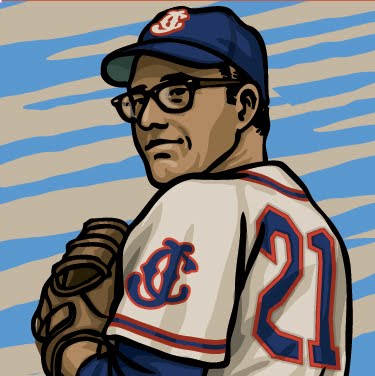This is the second of 5 Bushwicks Stories in 5 days. For the introduction to the Bushwicks and this series please go HERE first.
Go ahead, search all the baseball reference books and online stat sites for as long as you want, but you'll never find Dutch Woerner in any of them. Yet for almost two decades William "Dutch" Woerner was a super star to baseball fans in the New York City area. He didn't play for the New York Yankees or John McGraw's Giants, not even the lowly Brooklyn Dodgers. Nor is he one of the countless Negro League players who never got a chance to play in the majors because of their skin tone. Dutch Weorner was a Brooklyn Bushwick.
There were basically four types of player on the Bushwicks:
2) Aging big leaguer on his way back down into the civilian world.
3) The career minor leaguer who just didn't have that certain "something" to make the majors.
4) The guy who had all the talent in the world, but never wanted to turn pro.
Dutch Woerner was one of the later.
In the early 1920's the Bronx-born Bill Woerner blazed a three-sport path through Fordham's hallowed halls. You couldn't open the sports page of a New York newspaper without seeing his name mentioned in conjunction with some Fordham victory. By the time he graduated in 1924, Dutch was captain of the basketball team, All-American football hero and fleet-footed shortstop with offers sitting on the table from the St. Louis Cardinals and New York Yankees. He also had himself a business degree from a first-rate university.
For most red-blooded American kids in 1924, the career choice was obvious - pick the pro baseball career! But for Dutch Woerner and many other talented athletes, the lure of the business world was much more powerful. Countless college athletes gave up on their dreams and chose the safer, more lucrative path of a real job instead of the hard-scrabble world of pro sports. With the exception of golf or tennis at the club, their athletic career was over for good.
Fortunately for Woerner he had a third option. Because he resided in New York City - the epicenter of semi-pro baseball, a guy with his talent and name recognition could carve out a nice, well paid career for himself. Many of the other semi-pro teams in the New York/New Jersey area paid their players. The Bushwicks were not only the most successful semi-pro outfit around but they also paid the best. Depending on the level of talent, a guy signing on with Max Rosner could expect about $20 game. The average take-home salary in 1931 was about $35. Since the Bushwicks played doubleheaders on Saturday and Sunday and a weekday night game, an infielder like Woerner could go home Sunday with more than double the average man's paycheck - this on top of his regular job.
While weekdays he might be entry-level stock broker William Brendel Woerner, on weekends he emerged from the subway in Woodhaven Dutch Woerner - star second baseman of the Brooklyn Bushwicks.
Dutch anchored the Bushwick's infield from 1931 through 1936. During those years he was consistently in the top five for batting average and local newspaper coverage marveled at both his clutch hitting and his ability to cover the infield "like a circus tent". Woerner's day job sometimes clashed with his weekend athletic career and he had to miss some games over the years, temporarily retiring during the '36 season so he could dedicate seven days a week to his work. The following summer he joined the rival Springfield Greys. He was batting lead-off as usual in a July 3rd game against the New York Black Yankees when pitcher Roy Williams drilled Dutch in the head with a fastball. Woerner collapsed with a fractured skull and he was raced to South Nassau Communities Hospital where he hovered between life and death for seven days. He eventually recovered after a long hospital stay but he never played baseball again. As a side note to Woerner's beaning, the Greys experimented with wearing leather polo helmets borrowed from a local country club during a game, one of the earlier recorded attempts to develop a batting helmet.
As for Dutch Woerner, he apparently got out of the brokerage business and opened a bar and grill in Lakewood, New Jersey. In 1958 he returned to Brooklyn where he was inducted into the "Sandlot Hall of Fame". While it sure wasn't Cooperstown, Dutch could look back at a nice semi-pro career that enabled him to make almost as much as a big leaguer, while at the same time raising a family, advancing in his career and enjoy being regarded as a first-rate ballplayer - all without traveling further than a subway token away from home. The Brooklyn Eagle's reporter covering the event that day in 1958 remarked how good the former shortstop looked more than twenty years after he hung up his spikes...




No comments:
Post a Comment